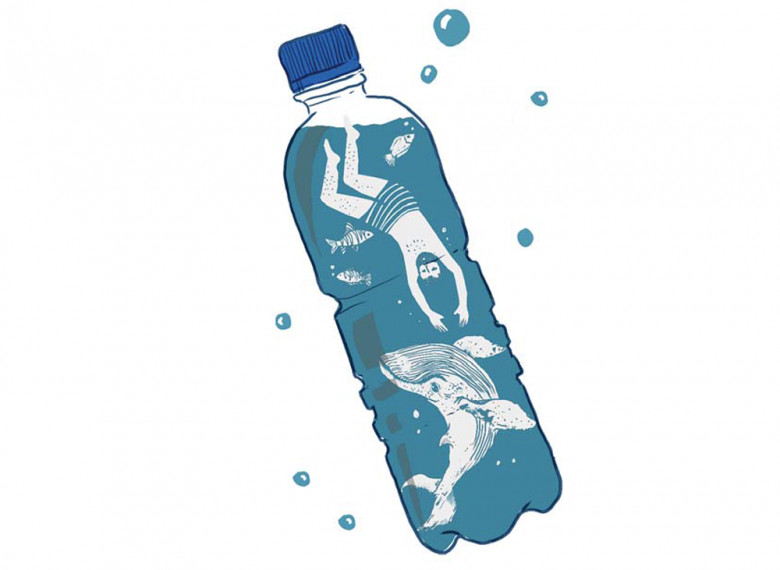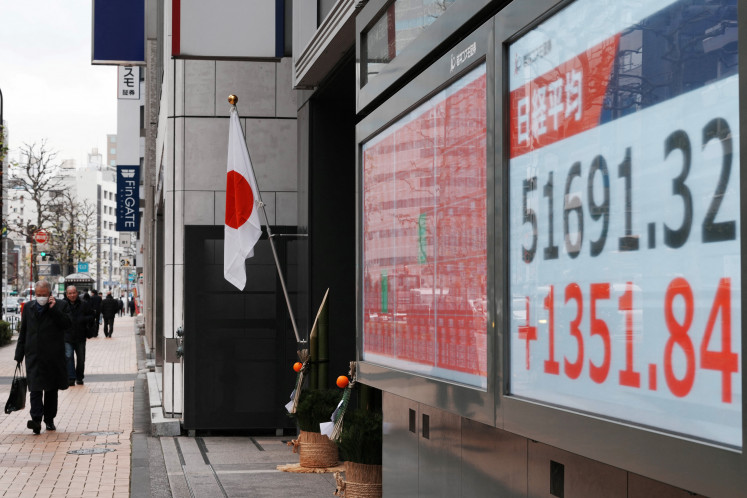Popular Reads
Top Results
Can't find what you're looking for?
View all search resultsPopular Reads
Top Results
Can't find what you're looking for?
View all search resultsQuo vadis, global ocean governance?
Besides providing a large source of global food, fueling economic development and protecting human health, the ocean acts as a massive climate regulator, emitting half of the Earth's oxygen and absorbing 25 percent of carbon emissions.
Change text size
Gift Premium Articles
to Anyone
 Pressures on our oceans are mounting: temperatures are increasing, ocean levels are rising, coasts are retreating, coral reefs are dying, fish are disappearing, plastics and pollution are overwhelming, large hurricanes are striking more frequently, mangrove forests are declining, coastal populations are migrating and countries are vanishing. (JP/Budhi Button)
Pressures on our oceans are mounting: temperatures are increasing, ocean levels are rising, coasts are retreating, coral reefs are dying, fish are disappearing, plastics and pollution are overwhelming, large hurricanes are striking more frequently, mangrove forests are declining, coastal populations are migrating and countries are vanishing. (JP/Budhi Button)
B
esides providing a large source of global food, fueling economic development and protecting human health, the ocean acts as a massive climate regulator, emitting half of the Earth's oxygen and absorbing 25 percent of carbon emissions. The Organization for Economic Cooperation and Development (OECD) estimates that coastal and oceanic economic activities contribute over 1.3 trillion euro (US$1.45 trillion) to the global economy.
Yet, the outsized importance of the ocean stands in stark contrast to the comparatively scant attention the global community pays to improving international governance over the seas. The Paris Agreement, for instance, mentions the word “ocean” just once in a preambular paragraph: “Noting the importance of ensuring the integrity of all ecosystems, including ocean…” More focus has been placed on discovering outer space than probing the bottom depths of our oceans.
It is not as if there were not a lot of bodies devoted to the topic. On the contrary, the global architecture on ocean governance is so incredibly diffuse that it renders enforcement of its laws and norms rather weak.
The following overview of many of the overlapping international organizations, intergovernmental bodies, conferences and civic groups tasked with governing the use of our oceans will serve to demonstrate the startling complexity of this institutional muddle.
London, for instance, is home to the International Maritime Organization (IMO), which oversees the safety and security of shipping and pollution from vessels. The IMO founded two universities geared towards maritime studies: one located in Malmö, Sweden, known as the World Maritime University, and another located in Malta which specializes in legal issues, the International Maritime Law Institute.
Meanwhile, Rome is host to the Food and Agriculture Organization, which has some fisheries responsibilities including combating Illegal, Unreported, Unregulated Fishing (IUUF), although it has no actual jurisdiction on prosecuting crimes in fishing industries. Outside of the FAO, there are 17 regional fisheries management organizations that manage fisheries, but are ill-equipped to face the challenges of fighting heinous crimes perpetrated by IUUF vessels, such as slavery at sea and gun smuggling.
The United Nations Office of Drugs and Crimes (UNODC) in Vienna is working with Interpol to fight crimes in fisheries with limited global support from a few countries, including Indonesia. The UNODC has a manual on maritime crimes, but not for fisheries crime.
Safety of navigation in terms of proper chart making and hydrographic survey is under the purview of the International Hydrographic Organization (IHO) in Monaco, while it is the Nairobi duty station of the UN Environment Program (UNEP) that is tasked with developing new marine and coastal strategies. On top of all that, marine science is taken care of by yet another body, the International Oceanographic Commission (IOC), which is based in Paris under the aegis of the UN Educational, Scientific and Cultural Organization (UNESCO).
The UN headquarters in New York hosts a number of ocean-related gatherings, such as the Meeting of the States Parties of the UN Convention on the Law of the Sea (UNCLOS), or the Commission on the Limits of the Continental Shelf and the 2017 Ocean Conference. Among the organizations created by UNCLOS, Hamburg hosts the International Tribunal on the Law of the Sea, while seabed mining is the mandate of the International Seabed Authority (ISA) based in Kingston, Jamaica.
There are also numerous ocean initiatives organized by individual countries, such as the Our Ocean Conference that was the brainchild of former United States secretary of state John Kerry. Civil society has also become organized on the topic of ocean affairs, such as the Global Ocean Commission.
Under this complicated array of international organizations, a research vessel conducting a seabed mining survey is likely to have complied with the rules of the ISA, the IHO, the IMO and possibly even the IOC. And yet on issues of basic safety and environmental sustainability, these organizations have not been effective at coalescing to confront the threats to our oceans. For example, these organizations have not been able to deal with the pollution caused by the staggering emission of sulfur oxides (SOx) by cruise liners around Europe, which produced 10 times more SOx than 260 million cars in Europe did in 2017.
In the meantime, as governments remain uncertain about how to govern the seas, criminals will likely continue to smuggle people, drugs, weapons and rare animals, and IUUF will likely continue to be rampant.
The FAO will likely say that these crimes are not within its mandate and the UNODC may argue that fisheries are not their responsibility. Interpol can liaise, but it is not an international organization with a mandate to create norms to be implemented globally.
Meanwhile, the UN Security Council may create new international laws, such as sanctions, but it will remain absent on the issue of transnational crimes in fisheries. The World Trade Organization, on the other hand, does little to help, as it contributes to the IUUF issue through a fisheries subsidy.
Pressures on our oceans are mounting: temperatures are increasing, ocean levels are rising, coasts are retreating, coral reefs are dying, fish are disappearing, plastics and pollution are overwhelming, large hurricanes are striking more frequently, mangrove forests are declining, coastal populations are migrating and countries are vanishing. All the while, environmental threats have not eliminated — indeed, they may have even exacerbated — traditional geopolitical concerns like piracy or state conflicts at sea.
Given all of these challenges, we need a comprehensive and integrated approach to ocean governance that encompasses all oceanic and coastal matters. Unfortunately, the prospect of this happening is rather disconcerting.
One of the most significant flaws in the global governance of the seas is the lack of available information; specifically, transparent and open data about the state of the oceans provided by individual countries around the world. By encouraging all countries — individually or through their own regional organizations — to publish and submit information on the state and health of their waters and coastal areas, the UN would be better equipped to assess the challenges to our oceans.
Countries have already agreed to similar exercises in other areas under the Paris Agreement. Extending self-assessment to oceans would be highly desirable, especially given the fact that the state of our oceans is deteriorating and that we, as human beings, have so far been unsuccessful in keeping our oceans healthy and secure.
Ocean governance may not have the romanticism of outer space or have a grip on public attention like calls for a space force, but it is nonetheless a crucial topic. The international community is responsible for addressing the common environmental and geopolitical challenges of our times.
***
President of 20th Meeting of States Parties to United Nations Convention on the Law of the Sea and Indonesian ambassador to Germany. This article initially appeared on Dec. 11 in Europe’s World, the online publication of Friends of Europe.










